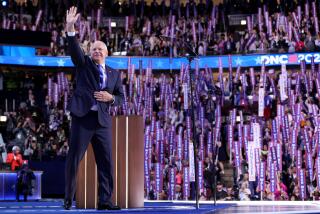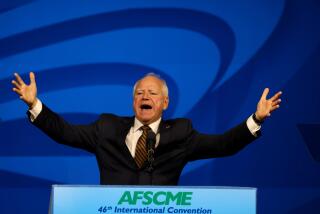Walesa Finds Chicago Is His Kind of Town
- Share via
CHICAGO — This was Lech Walesa’s kind of town Saturday.
The city that is home to the largest Polish population outside of Warsaw poured out its heart and its wallet to the Solidarity hero.
A crowd estimated by officials at 20,000 braved 24-degree weather to cheer Walesa at a two-hour downtown rally that was broadcast live on local television.
Earlier, huge trucks of flour and detergent for the Polish people were donated and put on display outside one hotel where the labor leader and Nobel laureate spoke. And Illinois’ state treasurer pledged that the state will buy millions of dollars of newly issued “Poland Bonds,” a joint venture by the Solidarity-led Polish government and a Polish-American organization to meet Walesa’s plea for economic rebuilding aid.
As he has done every day on his first visit to America, Walesa beamed, bowed and flashed victory signs everywhere he went. But here, among crowds where Polish was often spoken more than English, the smiles were bigger, the hugs were warmer and the grips on shoulders were stronger.
Only in Chicago, which has a Polish population of about 800,000--more than a quarter of them immigrants--would state politicians propose creating a trade office in Warsaw, as they did last week.
Only in Chicago, which had not experienced this kind of excitement over the arrival of a dignitary since Pope John Paul II visited for three days in 1979, would a leading newspaper publish Walesa’s daily itinerary as well as record the exact time his plane landed Friday night from New York (10:41).
Only in Chicago would Walesa be presented with a football helmet “on behalf of all the Grabowskis,” as one of his hosts put it, referring to the Polish surname that Chicago Bears coach Mike Ditka uses as a catch-all for the Bears fans.
And only in Chicago would Walesa, introduced to the daughter of a former president of the national Polish-American Congress, kiss the attractive Marilyn Mazewski not once on each cheek but five times.
The rally, followed Saturday evening by an unplanned visit to a Polish cultural center, marked the first appearances before the general public that Walesa has made during his seven-day trip, which concludes today in Philadelphia.
In Washington, where he spent four days, and then in New York, Walesa was scarcely visible to the outside world. But, on Saturday, there were crowds of people, many of them straining for a peek or to snap a photograph, at each stop of Walesa’s motorcade.
Walesa’s message throughout a day of speeches to civic and political groups was unchanged. He asked for a business partnership with Poland, which his union-turned-political party now controls, and he promised not to beg.
“We’re not trying to rip you off,” he said. “You can have two lovers, Poland and America.”
The difference in Chicago was that when he finished that speech, to a convention of the Polish-American Congress, the audience, which had needed no translator, immediately stood and broke into a Polish folk song.
“One hundred years, one hundred years, may you live one hundred years,” they sang.
Later, in the downtown Daley Plaza rally--billed as an international cultural festival and including a gospel choir, Chinese dancers and a Chicago Symphony Orchestra brass ensemble--Walesa admirers waved banners of Solidarity and of many local unions.
“We were waiting for Walesa for many years,” said Marina Sarniak, a middle-aged Polish immigrant, speaking through a silk scarf that covered her freezing face. “We are so happy to see him. We are so happy to see Poland free.”
“It’s hard to describe,” said Ted Bowen, a coal miner from Cutler, Ill., who said he’d driven 325 miles after getting off work Friday to see Walesa and to pass out literature about the United Mine Workers strike against the Pittston Coal Corp. in Virginia and West Virginia.
“What he proved is that if you got the heart and the will power, you can accomplish it,” the khaki-clad Bowen said.
Sharon Porter, a college student, said that is why she borrowed her mom’s old Super-8 movie camera and came downtown to try to film Walesa, even though she couldn’t see him from where she stood.
“I’ve just been reading all the reports about Eastern Europe, and it’s so amazing, all the stuff that’s going on. I’m getting more of the spirit,” she said.
Monica Lezon, a student at Kosciuszko School in heavily Polish northwest Chicago, which sent a delegation of students to the rally, pondered Walesa’s significance.
“He’s important to Poland,” she said, “because . . . .”
” . . . he means ‘Solidarity!’ ” interrupted a classmate, Konrad Boruta.
Walesa, bareheaded, bundled in a parka and reportedly suffering from the flu, urged those attending the rally--many of whom could barely hear him because of a poor sound system--to “help us to survive. Help our spirits to survive . . . . Poland belongs to all Poles. We want to build a new Poland . . . . There is no other road for Poland other than the one we’ve entered.”
At a civic luncheon attended by more than 1,000 people, Walesa threw a fist into the air when Sen. Paul Simon (D-Ill.) announced that the U.S. Senate had approved a conference committee report in the early-morning hours that provides nearly $1 billion in aid to Poland.
At the Polish-American Congress convention, officers of the congress announced the Poland bond program, saying that it represented Poland’s first attempt to finance capital improvements the way the United States routinely does, by issuing bonds in exchange for cash. The program is the brainchild of a Polish-American bond attorney from Michigan.
Michigan’s state treasurer, Robert A. Bowman, announced at the convention that he was using state employee pension funds to buy the first $10 million in a $100-million issue.
“We firmly believe we can invest in free enterprise in Poland,” Bowman said.
Illinois’ state treasurer, Jerry Cosentino, who is not Polish but took pains to mention that five of his brothers married Polish women, told the Polish-American Congress audience that he wanted to buy $25 million in bonds, pending legislative approval.
When Walesa left the hotel where the congress was meeting, he was greeted by scores of admirers and the sight of trucks of supplies donated by several American corporations. Those donations and several by other firms Saturday were valued at over $1.5 million, according to congress officials, who said their relief-for-Poland program has sent $140 million in aid since 1981, when Poland’s Communist government proclaimed martial law and banned the Solidarity union.
Some Polish-American leaders said that Walesa’s visit was a tonic after the disappointment they experienced in September when Cardinal Jozef Glemp, Poland’s Roman Catholic primate, canceled a visit to Chicago and other U.S. cities in the wake of a controversy over the presence of a Carmelite convent at the former Nazi death camp in Auschwitz.
Glemp had criticized Jewish leaders for their objection to the continued presence of nuns at Auschwitz.
Walesa saw first-hand Saturday the consequences of the free union movement he symbolizes. Nearly 1,000 Chicago policemen demonstrated across the street from one of his appearances to publicize a contract dispute with the city.
At a meeting with Chicago labor leaders, Walesa, an electrician, was made a member of Local 134 of the International Brotherhood of Electrical Workers, complete with an embossed jacket.
“I’m very happy,” he responded as he modeled the blue jacket, then grinned. “But I won’t be paying union dues. I don’t have the money.”
More to Read
Sign up for Essential California
The most important California stories and recommendations in your inbox every morning.
You may occasionally receive promotional content from the Los Angeles Times.













